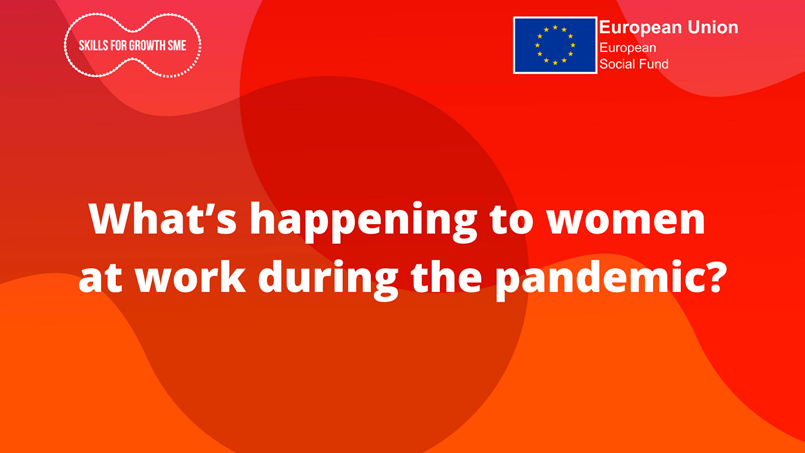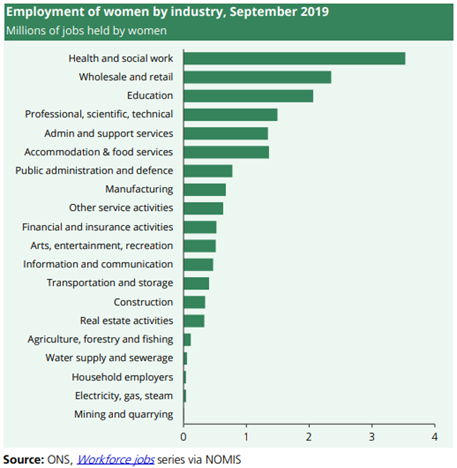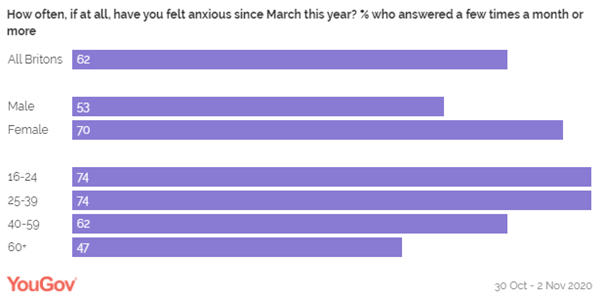Skills for Growth - SME Support is a fully funded, tailored service to help upskill your employees and improve business productivity.

What’s happening to women at work during the pandemic?
Have women in the workforce been hit harder than men during the pandemic? Everyone has felt some sort loss, limitation or adversity since the outbreak of COVID-19 a year ago, but in this article, we examine the specific effects that the virus has had on women at work in the UK.
Women on the front line
Women have made up the majority of the highest-risk job roles during the pandemic, standing at a hefty 2.5 million of the 3.2 million people employed in high-risk roles. In fact, in the UK, 77% of frontline works are women and while significantly less likely to die from the virus, that doesn’t put them out of harms way of the short- and long-term effects of COVID. The majority of low paid jobs in the UK are also held by women, at 69% of all people in this category and studies show that low-paid women are at high risk of exposure to the virus as they are more likely to be in jobs such as social care, nursing and pharmacy.

Some of the industry sectors most populated by women have also been the hardest hit by the consequences of the pandemic, such as the care sector, wholesale and retail trade and the education sector, who have suffered from last-minute lockdowns and heavy operational restrictions.
Working from home with children
Amongst parents, Mothers are more likely than Fathers to have left paid work since February 2020 and are 47% more likely to have permanently lost their job or quit, as well as being 14% more likely to have been furloughed. Further to this, Mothers still in paid work have seen a larger proportional reduction of paid hours than their male counterparts and are more likely to be spending their work hours simultaneously trying to care for children and doing housework.
From the 8th of March, schools will reopen as part of the government roadmap to recovery, but what happens to mothers when schools suddenly shut? Parents with low literacy rates and little physical space suffer with the inability to accommodate for and contribute to their children’s scholastic needs and low income parents struggle with extra bills from heating and electricals in the house, providing adequate meals for their children and accessing technical, digital equipment to accommodate for the continuation of their children’s education from home.
Mental health issues
As we examine the previous statistics, it may come without surprise that women’s mental health has suffered more than men’s in the UK during the COVID pandemic.
Of all UK adults surveyed by YouGov, 70% of women reported that they had felt anxious since March 2020, compared to 53% of men. In particular, BAME women have struggled not knowing where to turn to for help, coping with demands on their time, dealing with fears of debt and anxiety around having to go out to work during the pandemic.

We’re a year into the pandemic now and in order to fulfil the nation’s hopes to #BuildBackBetter as we move forward, we must swallow the difficult pill that is acknowledging the adversity that women have faced during the crisis. Why have we been unable to protect women better in the workplace? What can we do to make things better for women working in the future? These are the questions we must confront as we move towards building a brighter future for life after COVID.
If you’re an SME owner in Greater Manchester, register your interest in our fully funded support programme and work closely through consultation and workshops with our Wellbeing Specialists and Skills Coaches to protect the women in your workforce to the best of your ability.
Call our team today on 0161 237 4444 to get started.
Resources
Top tips for creating a Parent and Carer friendly workplace | Skills for Growth – SME Support
Keeping employees mentally healthy during lockdown | Skills for Growth – SME Support
Wellbeing Support Service | Skills for Growth – SME Support
Leading Well | The Growth Company
The Growth Company is an award-winning, not-for-profit social enterprise with a mission to enable growth, create jobs and improve lives. We provide individuals and businesses with a wide range of services that improve employment, skills, investment and enterprise for the benefit of all, and have been working in the Greater Manchester city region for more than 30 years.
This project receives funding from the European Social Fund as part of the 2014-2020 European Structural and Investment Funds Growth Programme in England.
The Department for Work and Pensions is the Managing Authority for the England European Social Fund programme.
Established by the European Union, the European Social Fund helps local areas stimulate their economic development by investing in projects which will support skills development, employment and job creation, social inclusion and local community regenerations. For more information visit https://www.gov.uk/european-growth-funding.
